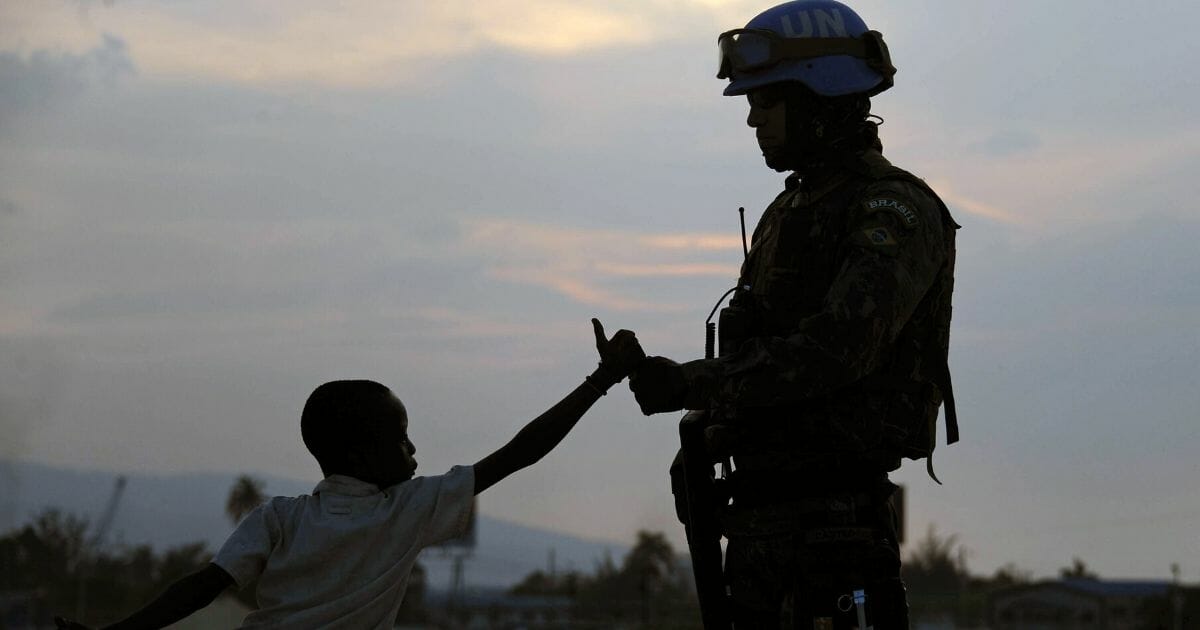
UN Peacekeepers in Haiti Reportedly Impregnated Girls as 'Young as 11' and Then Abandoned Them
A new study claims that United Nations peacekeepers assigned to Haiti from 2004 through 2017 fathered hundreds of children by Haitian women and girls as young as 11 and abandoned the mothers and children when their time on the island ended.
The study was published in the publication The Conversation. It said that 2,500 Haitians were interviewed about the plight of women and girls in the time period and that 265 mentioned that U.N. peacekeepers had fathered children while stationed there.
The UN’s long-running Stabilization Mission in Haiti ran from 2004 to 2017. It began as a response to political instability but was extended after a 2020 earthquake and then the damage caused by Hurricane Matthew in 2016. The study uses the acronym MINUSTAH.
“There were not only stories of women and girls being sexually assaulted by MINUSTAH but also of men and boys being similarly abused. But in our research, sexual assault was in the minority of reported sexual encounters. Instead, our data highlighted a much more pervasive problem, albeit one that has been reported less in the media – transactional sex with UN personnel,” the study wrote, noting that women and girls would trade sex for food or shelter.
“They had sex with the girls not even for money, it’s just for food, for one meal,” one Haitian is quoted as saying.
“The narratives reveal how girls as young as 11 were sexually abused and impregnated by peacekeepers and then, as one man put it, ‘left in misery’ to raise their children alone, often because the fathers are repatriated once the pregnancy becomes known,” the study said.
The study cites the testimony of unnamed Haitians.
“I see a series of females 12 and 13 years old here. MINUSTAH impregnated and left them in misery with babies in their hands. The person has already had to manage a stressful, miserable life,” one individual said.
A common thread in the study was the once U.N. personnel left, so did any support for the children they had fathered, leaving the mothers and children in poverty.
“He left her in misery because when he used to have sex with her it was for little money, now his term reaches its end, he goes and leaves her in misery, and then now she has to redo the same process so she can provide meals to her child, can’t you understand,” one individual said.
“One of my sisters gave birth to a child of the MINUSTAH. My sister had a baby with him because she met him, fell in love with him, he took care of her, but you know, they were sent away. That is why he stopped sending her things,” the respondent said.
The report said that the result was damaging to Haitian society.
“The soldiers destroy these young girls’ futures by getting them pregnant with a couple of babies and abandoning them. Basically, these actions of the soldiers can have a negative impact on the society and on the country in general because these young girls could have been lawyers, doctors or anything that would have helped Haiti tomorrow,” one Haitian told the researchers.
“Now some of them are walking in the street, or in the flea market and other places with a basket over their head selling oranges, peppers, and other goods in order to raise children they have with the MINUSTAH soldiers.”
The report was authored by Sabine Lee, a professor of modern history at the University of Birmingham, England, and Susan Bartels, a clinician-scientist at Queen’s University in Canada. Both receive funding from Canada’s Social Sciences and Humanities Research Council. Lee receives funding from the EU. Bartels receives funding from the World Bank Group/Sexual Violence Research Initiative.
Paula Donovan, a co-founder and co-director of AIDS-Free World, lashed out at the U.N. over the study.
“This research confirms that standard U.N. practice is to exploit women — from those subsisting in tents to those presenting at conferences — and then squash them like bugs if they dare complain about sexual abuse and threaten the U.N. patriarchy’s 75-year-old culture of entitlement and impunity,” she said in a statement, according to The New York Times.
Lee said the problem is also one for nations that contribute peacekeepers to various U.S. missions.
“It’s not a U.N. problem, it’s a Brazilian military problem, or a Uruguayan military problem,” she said. “The U.N., though, hasn’t found a way to hold the troops of the member states to account.”
Truth and Accuracy
We are committed to truth and accuracy in all of our journalism. Read our editorial standards.
Advertise with The Western Journal and reach millions of highly engaged readers, while supporting our work. Advertise Today.












